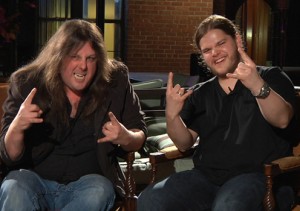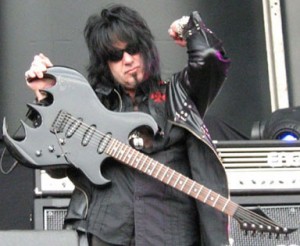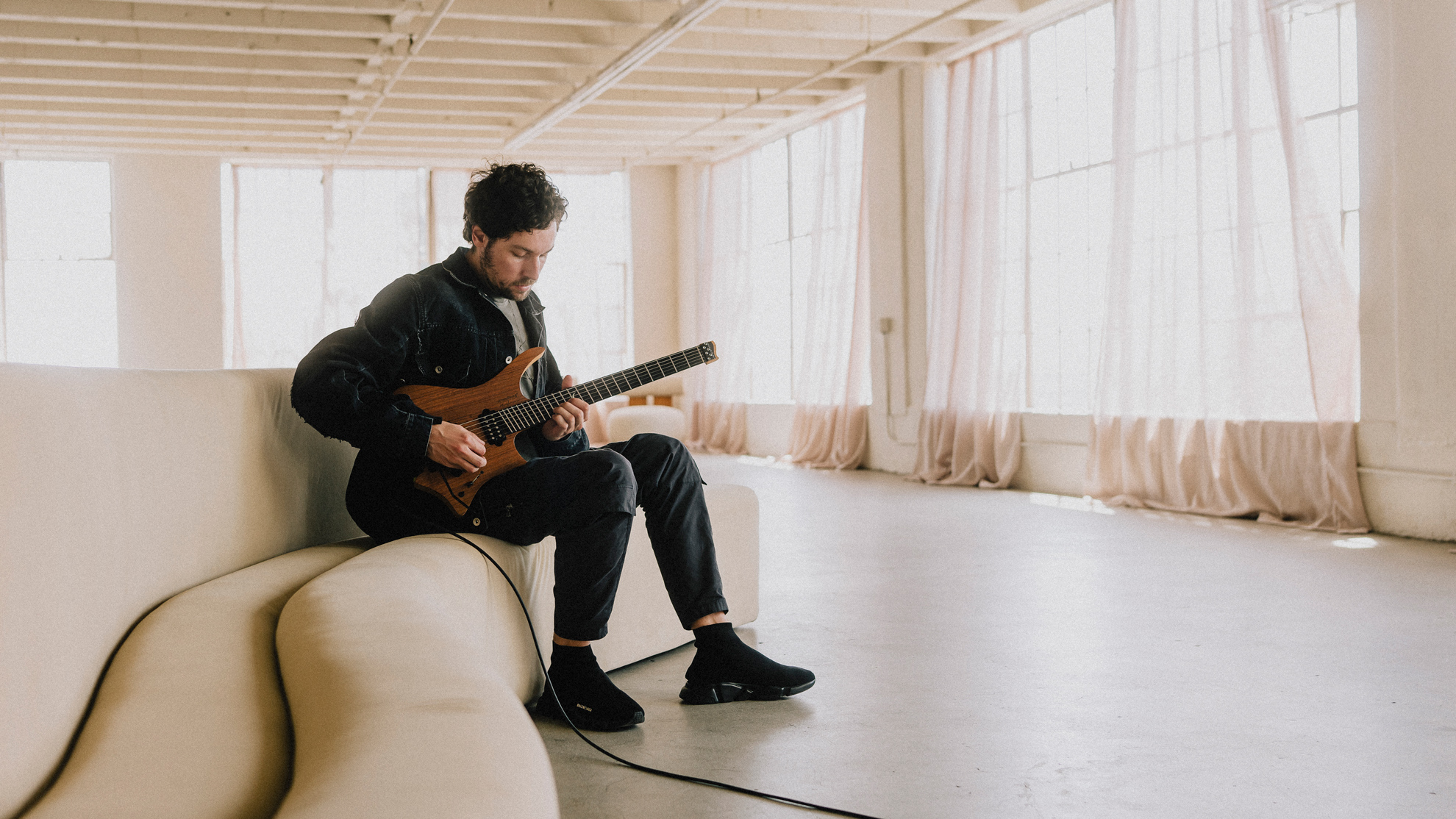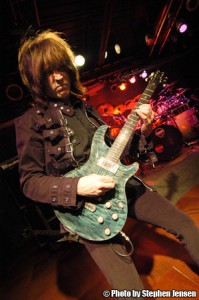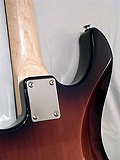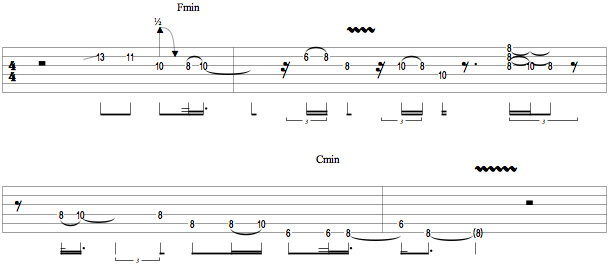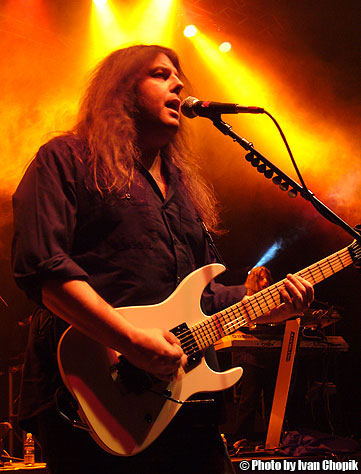 Michael Romeo is the founder and leader of power/progressive metal band Symphony X. This is a band that has been able to create their own unique style of music, blending sounds of classical composition and progressive heavy metal with extraordinary musicianship.
Michael Romeo is the founder and leader of power/progressive metal band Symphony X. This is a band that has been able to create their own unique style of music, blending sounds of classical composition and progressive heavy metal with extraordinary musicianship.
As a guitarist, Romeo is known for his incredible technique with his own brand of tapped arpeggios, smooth legato phrasing, and lightning fast alternate picking. At the same time, his playing exhibits tasteful inflections and a strong sense of melody. Guitar World named him one of the Top 100 Greatest Heavy Metal Guitarists of all time.
Paradise Lost, the bands’ latest offering, is arguably their darkest and heaviest to date. The band is currently finishing up their headlining U.S. tour and getting ready for a European tour this fall with the prog-metal powerhouse Dream Theater. To get more info on Michael Romeo and Symphony X, check out www.symphonyx.com.
IC: How’s the tour going so far?
MR: It’s good man – It’s been good shows every night. Pretty smooth, no real troubles or anything.
IC: The new album, Paradise Lost, is one of your best-selling albums, if not the best. It’s cracked the Billboard Top 200. What do you attribute that success to, in comparison to your previous releases?
MR: I think the songwriting is better. It’s a little more accessible maybe. Production-wise it’s a little better. Recording-wise… all around, you know? And I think a lot of the metal stuff is coming back. There’s kids in my neighborhood that play guitar, play drums… they’re into this kind of thing now. You hear people playing again.
There was a time where dudes just learned two chords all fucking out of tune and it was like “what are you doing?” Now, the guys are listening to all this stuff. So I think that too is a part of it. People are looking for some new music. That’s good.
IC: How would you say the writing is different on this album, compared to say The Odyssey or V?
MR: With every record we talk about what we’re going to do. This one we said, “let’s go a little more song-oriented, but still have the chops and still have all the things we do, but maybe more focused songs, more guitar-oriented riffs, that’s kinda thing”… more METAL.
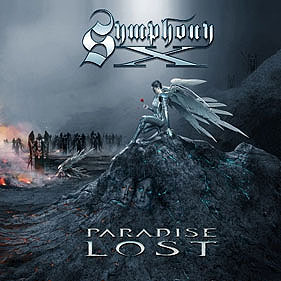 IC: I understand this album was based off of John Milton’s Paradise Lost. Is it a concept album or did you just take inspiration from it?
IC: I understand this album was based off of John Milton’s Paradise Lost. Is it a concept album or did you just take inspiration from it?
MR: No, it’s not a concept record. We didn’t want to do some big story, all cheesy, and all this garbage. We had a couple songs done already and they were all pretty heavy and they were all pretty dark. And we were going to try to work on a long tune – a big long epic kind of song. And it’s just wasn’t happening. It didn’t feel right.
We were thinking about using Milton’s thing for that long song, like the Odyssey with the Odyssey song, but looking at the other material we already had and all the pieces I had laying around it was like, “let’s just use the Milton thing as an idea for everything and we don’t need to do the long song,” ‘cause it just didn’t feel right. So it ended up where the songs that didn’t fit, we made them fit just by putting in some orchestra or some choirs or something. So everything does have this cohesiveness to it.
IC: And speaking of the orchestra and choir – you have a lot of orchestration throughout all of your music. Where does the inspiration for that come from?
MR: I love all that stuff man. I love film music, I love all that…
IC: Can you cite some particular influences or is it in general just the vibe of that sound?
MR: Early on I was more into Bach and the Beethoven and that kind of thing. Over time you start to listen to other things, and there was Wagner and Rimsky-Korsakov, then Stravinsky and Holst, and the 20th century guys. Now it’s like all like Jerry Goldsmith and John Williams, and all those guys. I think that’s cooler for what we do to, cause it’s more visual I guess you could say. It just seems to fit the music better. So all that stuff goes into it.
IC: What is your background on orchestration? How did you get into actually applying it to your music?
MR: Just studying man. Just getting a lot of books on orchestration and a lot of reading. But most importantly, listening to things with the score. You get the full score of like “Rite of Spring,” or Firebird, Stravinsky or something and just look and you can start to see what instrument textures sound like together, what works, what doesn’t work, you know what I mean? So you develop… it takes a long time I guess on your own. I definitely did work at it a lot. And I still feel like I don’t know a whole lot. I mean I know enough, but you can just go on and on learning shit, so…
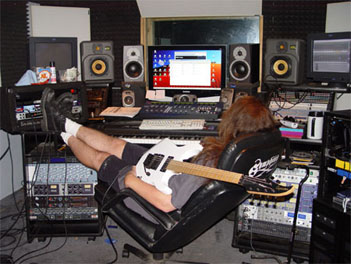
Michael Romeo in the Symphony X Studio
IC: Do you program these arrangements in your studio or do you go out and record with a full orchestra and choir?
MR: I do it all in my house, man.
IC: What do you run it through?
MR: Well, for the orchestra, I have two computers set up; one is the main recording one, running Nuendo and a bunch of stuff on there, and it’s networked together with the other computer as a Gigastudio [Tascam]. And I have a bunch of [sound] libraries, but probably the most dominant one is this Vienna symphonic library. It’s pretty fuckin’ pricey man, but with the right editing and if you know what you’re doing you can really make it sound pretty believable.
IC: It’s been 5 years between the new record and the previous record, The Odyssey. What happened during that break?
MR: Oh man, it wasn’t even a break really. We started talking about the record in 2004. We never had a situation where we were still doing stuff and trying to work [on the record]. It was always like we’d play a little… (Or like the first couple of albums we didn’t even play so we just wrote, recorded the record, wrote, recorded the record… and then by the fourth record we were touring.) …so it was like we’d tour for a little bit, come back and write.
But with the Odyssey now there was stuff happening in the [United] States, a lot more touring. So in 2004 we started talking about the new record and then we were offered the Queensrÿche tour, so we stopped writing and practiced for a month, went out on tour for a month, whatever…came back, tried to work again. And then the Gigantour thing came along with Dream Theater, Megadeth, and then you know… same thing – rehearse, out for whatever…
By the time that was over at the end of 2005 we just said, “We just can’t do anything else. We gotta finish writing the record and record it.” It really only took maybe like a year with the record. It’s just that we didn’t really start until later. There was too much going on and we just couldn’t really focus.
IC: Sound like you’re getting a lot more attention now, touring with bigger bands, and headlining your own tour in support of a new album that cracked the Billboard Top 200. It was rumored that a couple of years ago most of you guys still had day jobs.
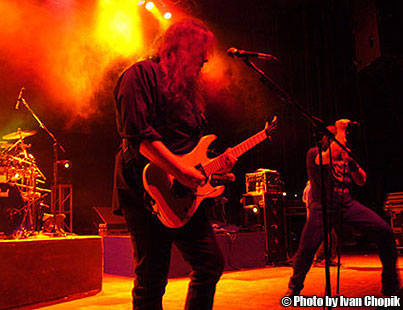 MR: It depends. We’re working now, so we’re fine. But the time like with the albums and the writing, that’s the hard time. That’s a tough time financially, because you have a little money to put towards the record, there’s five guys, so you know… But some of the guys they’ll teach or work at a music store – get by. That kinda thing, you know … you do what you gotta do. When we’re out here working, we’re fine, making money – it’s all good.
MR: It depends. We’re working now, so we’re fine. But the time like with the albums and the writing, that’s the hard time. That’s a tough time financially, because you have a little money to put towards the record, there’s five guys, so you know… But some of the guys they’ll teach or work at a music store – get by. That kinda thing, you know … you do what you gotta do. When we’re out here working, we’re fine, making money – it’s all good.
IC: When you’re not out with Symphony X, what do you like to do in your free time?
MR: There ain’t none. Ain’t no free time, man. We got done with this record, and before it was even out we were playing. We did a show in New York, we went over to Puerto Rico, South America… before the album even came out. So then the album’s out, so now we’re doing this. And this tour ends August 11th or 12th or something, in a couple days. And then we have about a month off. But really, I mean it’s like a month of rehearsing, getting our shit together to go out with Dream Theater. We’re going out like 2 months with those guys in Europe. So you’re always doing something man.
IC: You’ve played with those guys [Dream Theater] on Gigantour. What was that like? Do you have any expectations coming into this tour?
MR: Nah man, I mean those guys are totally cool. They’re all great musicians too. They’re cool guys, we get along good. It’ll be actually a vacation pretty much, you know… playing and then just hanging out. Yeah, should be cool man.
IC: Tracking back a little bit, when you were just getting started out with playing the guitar, you obviously put in quite a few hours honing your technique. What was your practice routine like, especially during that period and compared to now?
MR: Oh man, now I don’t practice at all… nah, that’s not true. I practice once in a while. Or I practice if I feel like I’m getting rusty. I mean, sometimes there is just times you want to practice and maybe try some new things. Now it’s more about the writing and doing things like that. But in the past, yeah it was full on practicing all the time.
In the beginning I got some lessons from a good a finger style guy. He was great all around, but he was a great finger style classical guy. And later you know, learning chords, the pentatonic scale, and a lot of that. And after that, a lot of it was self-taught just by learning Van Halen, Randy Rhoads, Uli Jon Roth. And then just right down the line – Paul Gilbert, Yngwie Malmsteen… all those guys. So yeah just learning stuff like that, reading books on theory, learning all that stuff, and just trying to put it together, and come up with cool shit.
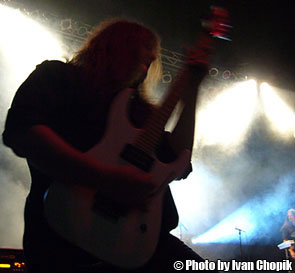 IC: Did you ever consider going to a school like Berklee or G.I.T.?
IC: Did you ever consider going to a school like Berklee or G.I.T.?
MR: When I was younger, yeah, I probably thought about it. I was more of a band guy though, you know what I mean? I thought for me it was better on my own because if there was something I wanted to learn, I would figure it out. I’m kinda like that, like with the orchestra thing. It’s out there, and like I said, looking at a score and listening to the music, you get a lot from just that alone. And reading music, I mean I played piano when I was young, so I could read. So along the way I was able to do what I needed to do.
IC: Let’s talk a little bit about your gear. You changed from ESP to Caparison guitars. Why the big change? I understand you played the ESP’s for years before that.
MR: ESP’s are great. With the Caparisons, this guy in this band Evergrey let me try his guitar, (we were playing at some show together) and it was a real nice guitar. And I contacted the Caparison people – they’re from Japan, we did real good in Japan, so they were more than willing to do whatever. With ESP they were just giving me some guitars to play, just what they had – kinda stock thing.
They were great, but the neck was a little too flat. The fingerboard didn’t have enough of a radius on it. And I got used to it over time, but when I first started playing for years and years I had this old Kramer – a Kramer Pacer. And it had a real nice neck, had a little bit of meat in the back, and a nice curve on the fingerboard. I sent that neck (cause I still have that guitar) to the Caparison guys, and I sent them a Fender neck I had too, that I liked the thickness of. And they just made this neck – I said you have to make the radius from this one and the grip from this one, and whatever… and they made this neck, after those two. They took good care of me so I’m cool with that.
IC: Are you still using the EMG pickups in those guitars?
MR: Nah, I never liked the EMG’s. One of the ESP’s they sent me had EMG’s in it. And I mean it sounded good. I think like for certain things, like really heavy rhythms they would be great. But there’s something…how can I explain it man? Just some kind of a touch that’s not there. It’s like almost like it’s very compressed and the dynamics are a little weird. There’s something to me that doesn’t feel the same as like a regular pickup. Definitely the dynamics of it. But for rhythms, for heavy shit I mean the EMG’s would probably be great. But I like something a little more that you can feel when you need to dig in and has good response and reacts, you know?
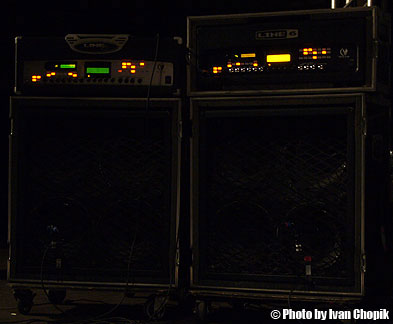
Michael Romeo’s Live Rig
IC: And as far as amps go, I know you like to use Line6 for live performances. Why not tube amps?
MR: Well, when we record all the time in the studio, it’s always some sort of tube amp, or a combination. With the new album, I have an Engl Fireball and there’s a couple tracks of that, and then there’s a couple tracks of a Marshall JCM800. There’s some different things going on.
But for live, it’s like the Line6 is great because you don’t need anything. People are like “oh, it’s not tube, blah, blah, blah…” and it’s like “Ah, who the fuck cares? It sounds good and it’s easy.”
I don’t need a bunch of batteries, I don’t need pedal boards, all these pedals, all this garbage all over the floor, wires all over the fuckin’ place. It’s like one pedalboard, Ethernet cable… and it sounds the same all the time – you don’t have to worry about tubes breaking or any of that.
It’s not a tube amp, it isn’t the same, but I think in a live thing, it’s really hard to tell. The band’s playing, you’re going through the PA and every other thing. To me, it’s close enough where I feel good playing, and it’s just easy. You setit up – boom, done.
IC: When working with tube amps in the studio, do you boost them at all with a Tubescreamer or anything like that?
MR: Yeah, the Ibanez Tubescreamer.
IC: One of the original ones?
MR: I don’t have the old, old original one. I have the TS-9.
IC: What is the action like on your guitars?
MR: It’s I guess pretty standard. It’s not really low or high. If it’s too high all the hammering stuff’s hard, but if it’s too low the notes just don’t sustain. So yeah it’s pretty standard action.
My setup is nothing special – standard Strat type of thing, tuned down, 10 gauge strings, and pickups are DiMarzio ToneZone in the neck and a DiMarzio X2N in the bridge. So yeah I’m really not fancy. I’ll just plug into whatever and play, I don’t give a shit, you know?
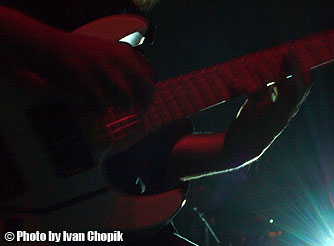 IC: And your tapping style, did that come from the Randy Rhoads and Eddie Van Halen influences? You took it to the next level, so how did you get there?
IC: And your tapping style, did that come from the Randy Rhoads and Eddie Van Halen influences? You took it to the next level, so how did you get there?
MR: Yeah, probably a little of both. I think Van Halen is the first time… (Or even Ace Frehley, cause that’s why I started. I was all into Kiss, and I wanted to be in a band and all that…. And then there was like that one live solo he… I think he stole it from Eddie though I’m not sure, I can’t remember. Eddie probably did it first.) But yeah, the old Van Halen and Randy Rhoads stuff did it.
And then when I started getting into Randy Rhoads, Ritchie Blackmore, Uli Roth, and those guys, they had that whole classical background. And then of course Yngwie and then you start to go back to some of the classical stuff and trying to figure out how to play maybe some violin piece or something and sometimes there’s no other way – you can’t pick it or it’s too impossible. So then the tapping thing starts to come into it. There was like this one song that I did with this guy Vitalij Kuprij, (keyboard guy – fucking awesome). He’s like “yeah I want to do this Beethoven…” Like “yeah man, I’ll do it, I’ll play it”
IC: Is that on any recordings?
MR: Yeah, it’s on one of his solo records.And it’s some crazy [sings melody]. On piano I guess it’s a pretty natural finger thing, but on the guitar I was like “Oh shit, what am I going do?” And then I did the tapping thing. But yeah, trying to learn things that maybe weren’t meant for guitar starts to lead you to these other things. All these little things kind of become like your own thing after a while. It just happens.
IC: As mentioned earlier, Symphony X has been growing significantly as a band. Where do you see the band going within the next 5 years?
MR: I have no idea. I just go day-by-day man. Luckily everything has been progressively better. From just the writing, and the band as guys. We’ve always been friends, but we’re still friends and it’s all cool. The touring has been better. And sales like you said. So as long as everything’s moving up and the money and everything, we survive, it’s cool. I’m not saying I wouldn’t want like a million dollar paycheck or two million dollars. That would be great, but I’ll settle for whatever. As long we can do what we do, and I can take care of my family and all that, it’s all good.
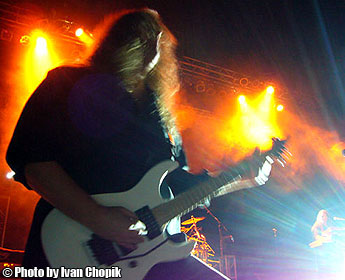
IC: Any advice to aspiring musicians around the world?
MR: Yeah man, for me it was just listening to different things. I’m pretty open-minded about all kinds of music. And I think sometimes people go through phases, where they’re really into one guy. That’s cool as long as like that changes every so often, so you don’t get the clone thing.
But yeah, that’s what it was for me. Early on it was like Kiss and Led Zeppelin, and then I went through this huge Randy Rhoads phase – I friggin’ knew every note, every fuckin’ amp setting, but then after a while it’s like “Ok, well he’s doing it already, so I gotta do something else – I gotta do my own thing.”
Yeah, just listening to different things man. It could be learning piano lines or violin lines, or just trying to incorporate all these different things with a band. It’s like, we’re a metal band, but there’s a Stravinsky influence somewhere. You always do your own thing if you take in a lot of different influences and you’re open-minded, listening to a lot of different things. That’s really what I do. And practice of course… I mean everybody knows to practice, but I guess it’s more what you practice.



